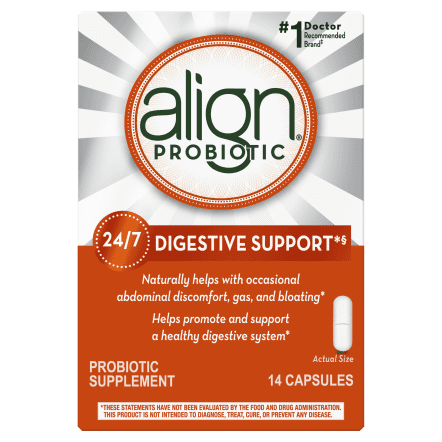
krisanapong detraphiphatGetty Images
Digestion is a coordinated process in which food gets broken down into nutrients for energy and cellular growth and repair. Sounds complicated, and it is. Plus, somewhere along the digestive chain of command — between signals from the brain, muscle contractions in the gastrointestinal (GI) tract, and secretions from various GI organs — things can go awry, resulting in diarrhea, constipation, bloating or other uncomfortable gut problems. But here’s the good news: There’s an easy fix to address those issues. Read on to learn how.
How Gut Bacteria Functions
The GI tract hosts a complex population of flora, which together play an integral role in your digestive health and general wellness. “Your gut microbiome is the collective of trillions of microorganisms (bacteria, fungi, viruses) that normally colonize your gastrointestinal tract,” says Nooshin Hosseini, M.D. of Vanguard Gastroenterology in New York City, NY. “When this delicate balance of microorganisms is disrupted — known as dysbiosis — a variety of health problems can result.”
To bolster your defense against gut imbalances and related digestive issues, Hosseini recommends limiting alcohol intake, only taking antibiotics when your doctor feels it’s necessary, and maintaining a healthy diet low in processed foods. “The Mediterranean diet, high in fruits, vegetables, whole grains, and fish has been shown to be beneficial in this respect,” she says.
How a Probiotic Can Help
Even the healthiest lifestyle choices can only take you so far. If you really want to shore up your gut microbiome game, probiotics can be a great option. “These are supplements that provide live organisms [or good bacteria and yeast] in the form of a capsule, drink, or food,” says Tiffany Mullen, D.O., co-founder and CEO of Vytal Health, a tele-medical group based in Milwaukee, WI. “These bacteria and yeast help populate the gut with common health-promoting organisms.” By introducing these good cultures, you can help your body offset any changes you might be experiencing in your gut microbiome.
According to Mullen — who referenced a study from The Journal of Nutrition — probiotics have been shown to help with or prevent a variety of common GI issues.
More research is certainly on the horizon, but what is clear is that, “by supporting the gut with probiotics, one optimizes not only the digestive process but also the immune system (70% of which resides in the gut),” says Mullen.
How to Get Probiotics
To introduce probiotics into your diet, look for probiotic foods containing cultures of good bacteria that can provide specific health benefits. This is where reading labels is important — not all “live cultures” are probiotics, so look for foods that specify the strain they include and the benefits they can offer.
Another option is to take a daily probiotic supplement, such as Align, which helps soothe occasional abdominal discomfort, gas, and bloating, to promote a healthy digestive system.*
If you have any health conditions or concerns, consult your doctor before beginning this sort of regimen. Ask about specific strains and/or combinations you should be taking and when.
You’ll also want to make sure you read the label for the ideal storage temperature of your supplements. Some probiotic supplements require refrigeration, but Align’s unique strain is designed to ensure the good bacteria remain alive and stable at room temperature — no refrigeration necessary.
Normal digestive functions can vary greatly from person to person, but ultimately, probiotics can be an effective tool in maintaining a healthy gut microbiome.
To learn more about probiotics and get $2 off your first month of Align, join the Healthy Gut Team Up here.
‡ Among Doctors who recommended a brand of probiotic in a ProVoice 2021 survey.
§ Fortifies your digestive system with good bacteria 24/7 with continued daily use*
*This statement has not been evaluated by the Food and Drug Administration.
This product is not intended to diagnose, treat, cure, or prevent any disease.
This content is created and maintained by a third party, and imported onto this page to help users provide their email addresses. You may be able to find more information about this and similar content at piano.io





